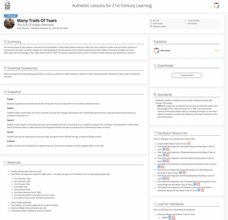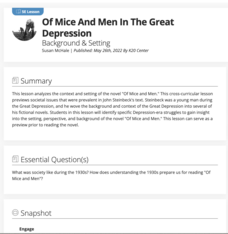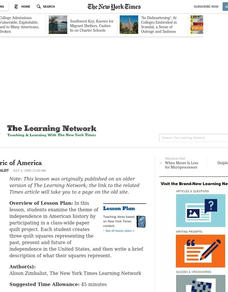National Woman's History Museum
Creating a Historical Thesis Statement
A strong thesis statement not only identifies the subject of an essay but also presents a claim that must be supported with evidence. After researching how nursing has evolved in the United States since the Colonial era, young writers...
Smithsonian Institution
The Suffragist: Educator's Guide for Classroom Video
Class members take on the role of historical investigators to determine why it took 40 years for women in the United States to get the right to vote. Sleuths view videos and analyze primary sources and images to gather evidence to answer...
K20 LEARN
Many Trails of Tears: The Era of Indian Removal
Cherokee, Chickasaw, Choctaw, Creek, and Seminole. All were forced off their ancestral lands in the southeastern United States as part of the Indian Removal Act of 1830. Young historians research the tribes' reactions to this removal and...
K20 LEARN
Whose Manifest Destiny? Westward Expansion
Your land is my land! Young historians investigate the concept of Manifest Destiny used by the United States government to justify western expansion. Jigsaw groups read primary source documents to gain an understanding of the movement...
Curated OER
Introduction to Abigail Adams
Remember this lady! Abigail Adams, the wife of John Adams, the second President of the United States, and the mother of the sixth president, John Quincy Adams, was much more than a wife and mother. This prolific letter writer is the...
Benjamin Franklin Tercentenary
Benjamin Franklin: Master Diplomat for One Last Time
At 81, Benjamin Franklin was the oldest delegate to the 1787 Constitutional Convention, where he exercised significant influence in shaping key elements of how the United States operates. The class examines his role, using “The Scene at...
Curated OER
Tracing Our Own Family Pilgrimages
The Pilgrims may have arrived in North America by way of the Mayflower, but chances are, your class members' ancestors came to the United States in another way. Guide them through an exploration of their own heritage, countries of...
Smithsonian Institution
We Have a Story to Tell: Native Peoples of the Chesapeake Region
How did colonial settlement and the establishment of the United States affect Native Americans in the Chesapeake region? Your young historians will analyze contemporary and historical maps, read informational texts, and work in groups to...
Stanford University
Annexation of Hawaii
Once an independent nation, Hawaii became part of the United States only after a business-sponsored coup of its queen. After examining newspapers from the 1890s, learners consider whether native Hawaiians wished to become Americans at...
Constitutional Rights Foundation
Winner-Take-All: The Two-Party System
Two's company, three's a crowd. High school historians learn about the Electoral College, a two-party, winner-take-all voting system in the United States. The instructional activity explains the pros and cons of the two-party system,...
Teaching Tolerance
Slavery as a Form of Racialized Social Control
An engaging lesson delves into the effects of slavery on society. Young historians read text excerpts, complete handouts, and participate in group discussion to understand how slavery was a means to control society and establish a racial...
Teaching Tolerance
Jim Crow as a Form of Racialized Social Control
Just because slavery was illegal doesn't mean it went away ... Jim Crow Laws took its place. An eye-opening lesson focuses on how Jim Crow Laws were used as a form of racial social control against African Americans in the United States....
C-SPAN
Landmark Supreme Court Case: Roe v Wade
Perhaps no issue is as controversial than abortion in the American landscape. Go beyond the rhetoric by examining the Supreme Court case that legalized abortion in the United States. A guided note-taking activity unpacks the arguments...
K20 LEARN
Manifest Destiny: U.S. Territorial Expansion
A close examination of John Gast's painting "American Progress" launches a study of the concept of Manifest Destiny used to justify United States' policy of westward expansion. Young historians read statements from persons with different...
K20 LEARN
Of Mice and Men in the Great Depression: Background and Setting
What were living conditions like in the United States during The Great Depression, and how do those conditions compare with today? That's the question young scholars consider as they prepare to read John Steinbeck's Of Mice and Men....
Curated OER
The "Yellow" Peril
Students discuss what happened on the west coast of the United States in 1942 from the perspective of either Japanese and Japanese Americans or their non-Asisan neighbors. They watch a video, where they are aware of both sides of the...
Curated OER
American History Review
Students review American History. In this American History lesson, students create a timeline that lists major events in American history. Students write a speech about their favorite American and create a diorama to model a scene or era...
Curated OER
South Korean Women at the Turn of the Century, with a Focus on the Modernity
Learners consider the role of women in South Korea. In this global studies instructional activity, students examine articles and interviews regarding women and educational achievement. Learners discuss women's issues in South Korea and...
Curated OER
North and South - Impact of the Abolitionist Movement
Young scholars examine history of slavery in United States, discuss abolitionists such as Frederick Douglass who worked to end slavery, listen to excerpts from Douglass' autobiography, and visit interactive Underground Railroad web site.
Curated OER
The Emancipation Proclamation
Students explore the historical importance of the Emancipation Proclamation. In this United States History instructional activity, students use the internet to research the specific events that were centered around the Emancipation...
Curated OER
Oral History of World War II
Students research how citizens from the United States respond to the onset, duration and aftermath of World War II. They view clips from the movie "Swing Shift" and discuss the roles of civilians, minorities and military personnel. They...
Curated OER
The Fabric of America
Students examine the theme of independence in American history by participating in a class-wide paper quilt project. Each student creates three quilt squares representing the past, present and future of independence in the United States.
Curated OER
We The People
Students consider the main concepts of the Preamble of the United States Constitution They research different issues explored in the Constitution which have both historic and modern connections.
Curated OER
Political Parties
Students engage in a instructional activity that is about the development of political parties in the United States government. They conduct research using a variety of resources. They use some key focus questions to guide the activities...
Other popular searches
- United States History
- United States Military History
- United States History 1920s
- United States History 1900's
- United States History 1700's
- United States History Essays
- Ap United States History
- Media United States History
- United States Sports History
- United States History K 2
- United States Labor History
- United States History Exam

























